In the United States, we're officially in spring-break season. Whether you are taking off on a mini-vacation or not, we think it's a great time to pause, catch your breath – and catch up on the latest crop of business, leadership, and tech books.
Here are ten picks that we think CIOs and other leaders can gain new perspective from – on topics including Silicon Valley's "brogrammer" culture, AI, blockchain, team building, and navigating culture change.
Brotopia: Breaking Up the Boys' Club of Silicon Valley
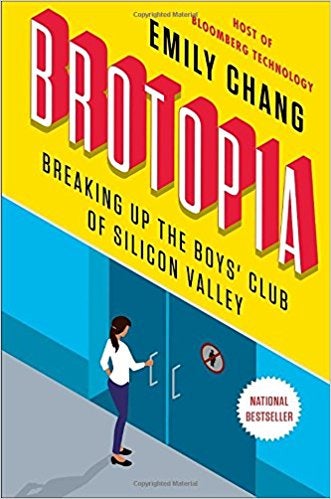 By: Emily Chang
By: Emily Chang
Book description (via Amazon): In this powerful exposé, Bloomberg TV journalist Emily Chang reveals how Silicon Valley got so sexist despite its utopian ideals, why bro culture endures despite decades of companies claiming the moral high ground (Don't Be Evil! Connect the World!) – and how women are finally starting to speak out and fight back.
Why you should read it: Peter Weis, CIO of Matson Navigation says, “I’m not just a CIO. I’m also a father of two daughters, one of whom works in Silicon Valley, and I’ve been in enough meetings with start-ups and venture capitalists to see the male-dominated culture first-hand. This important book provides an unflinching view into this systemic failure but also provides hope for a brighter, more inclusive future for women in technology. It’s a must read for any technology leader who seeks to be a change agent. Both business and society overall will benefit as this new future unfolds.”
Human + Machine: Reimagining Work in the Age of AI
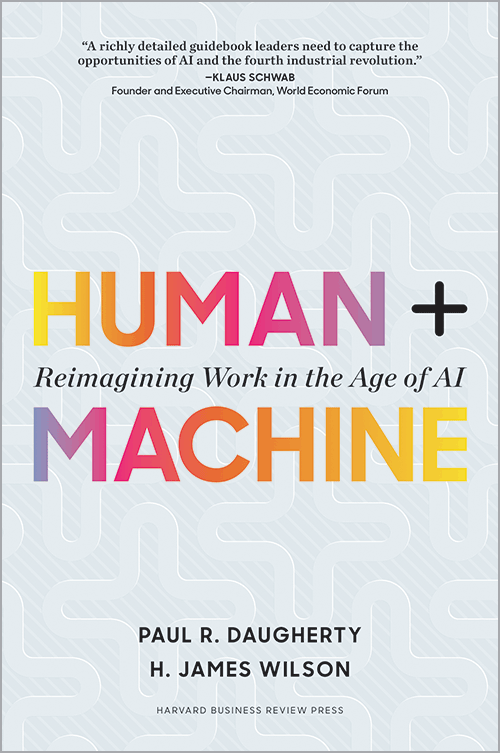 By: Paul Daugherty and H. James Wilson
By: Paul Daugherty and H. James Wilson
Book description (via Amazon): AI is changing all the rules of how companies operate. Based on the authors' experience and research with 1,500 organizations, the book reveals how companies are using the new rules of AI to leap ahead on innovation and profitability, as well as what you can do to achieve similar results.
Why you should read it: Fresh off the presses, this book from HBR offers readers “six entirely new types of hybrid human + machine roles that every company must develop, and it includes a ‘leader's guide’ with the five crucial principles required to become an AI-fueled business.” If you have plans to do more with AI this year, this book might be a good jumping off point.
Powerful: Building a Culture of Freedom and Responsibility
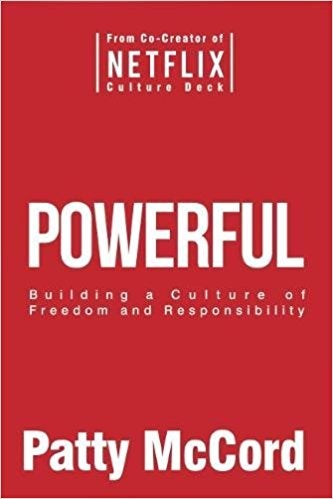 By: Patty McCord
By: Patty McCord
Book description (via Amazon): When it comes to recruiting, motivating, and creating great teams, Patty McCord says most companies have it all wrong. Her road-tested advice, offered with humor and irreverence, provides readers a different path for creating a culture of high performance and profitability. “Powerful” will change how you think about work and the way a business should be run.
Why you should read it: McCord, formerly the Chief Talent Officer for Netflix, shares her lessons learned around creating high-performance teams and culture. She co-created the Netflix Culture Deck, which Sheryl Sandberg called, “the most important document ever to come out of Silicon Valley." McCord's book makes the case for trading in traditional HR practices for “radical honesty” in the workplace.
When: The Scientific Secrets of Perfect Timing
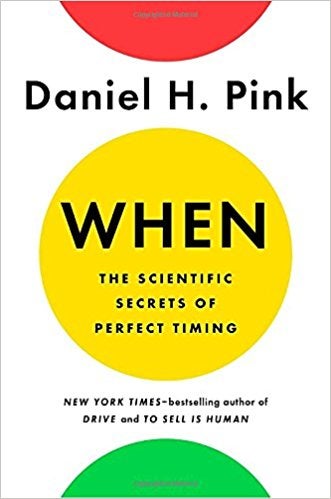 By: Daniel H. Pink
By: Daniel H. Pink
Book description (via Amazon): Drawing on a rich trove of research from psychology, biology, and economics, Pink reveals how best to live, work, and succeed. In “When,” Pink distills cutting-edge research and data on timing and synthesizes them into a fascinating, readable narrative packed with irresistible stories and practical takeaways that give readers compelling insights into how we can live richer, more engaged lives.
Why you should read it: We all know the saying “timing is everything.” In this book, Pink dives into the science behind this idea and explores why there truly is a good time and a bad time for everything – from when to make big life decisions, to when to hold the most productive meetings, to when to have your morning cup of coffee.
The Ideal Team Player: How to Recognize and Cultivate The Three Essential Virtues
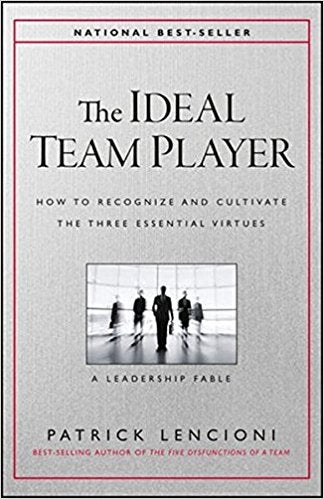 By: Patrick Lencioni
By: Patrick Lencioni
Book description (via Amazon): Lencioni presents a practical framework and actionable tools for identifying, hiring, and developing ideal team players. Whether you’re a leader trying to create a culture around teamwork, a staffing professional looking to hire real team players, or a team player wanting to improve yourself, this book will prove to be as useful as it is compelling.
Why you should read it: John Marcante, CIO of Vanguard’s Information Technology Devision, says, “The book is a practical guide to what it takes to become a true team player. It also helps hone your skills in choosing and developing the right individuals. This book and the previous book ‘The Five Dysfunctions of a Team’ are building blocks to forming the right organizational culture.”
The Truth Machine: The Blockchain and the Future of Everything
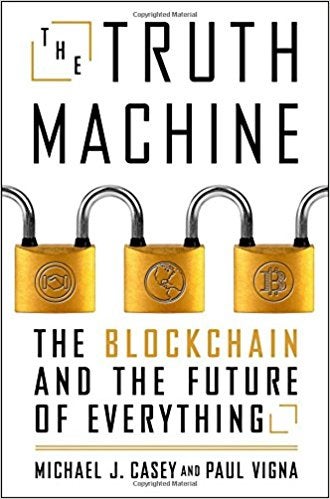 By: Paul Vigna and Michael J. Casey
By: Paul Vigna and Michael J. Casey
Book description (via Amazon): Casey and Vigna expose the challenge of replacing trusted (and not-so-trusted) institutions on which we’ve relied for centuries with a radical model that bypasses them. “The Truth Machine” reveals the empowerment possible when self-interested middlemen give way to the transparency of the blockchain, while highlighting the job losses, assertion of special interests, and threat to social cohesion that will accompany this shift.
Why you should read it: When it comes to blockchain, hype and misconceptions abound. Casey and Vigna hope to shed some light. One reviewer said, “An impressive and approachable book on the short history and profound future of Blockchain technologies. The geopolitical context and relevance to each of us as global citizens is a rich an important context this book delivers in addition to well researched and articulated descriptions of what Blockchain is.”
The Culture Code: The Secrets of Highly Successful Groups
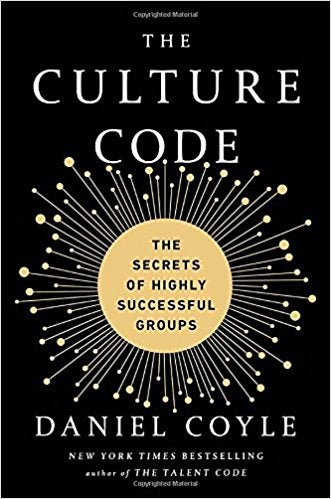 By: Daniel Coyle
By: Daniel Coyle
Book description (via Amazon): Culture is not something you are – it’s something you do. “The Culture Code” puts the power in your hands. No matter the size of your group or your goal, this book can teach you the principles of cultural chemistry that transform individuals into teams that can accomplish amazing things together.
Why you should read it: What makes some of the best teams in the world successful? Coyle aims to uncover their secrets in this book. Through his research, Coyle reveals the three key skills that bring a culture together and enable them to operate with “one mind.”
Thinking in Bets: Making Smarter Decisions When You Don't Have All the Facts
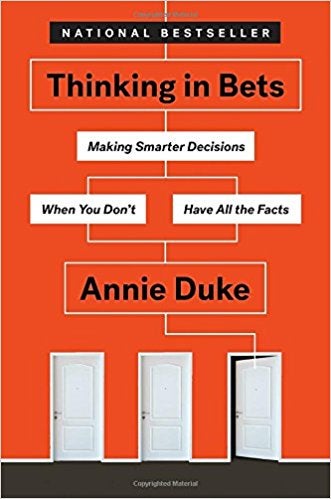 By: Annie Duke
By: Annie Duke
Book description (via Amazon): Annie Duke, a former World Series of Poker champion turned business consultant, draws on examples from business, sports, politics, and (of course) poker to share tools anyone can use to embrace uncertainty and make better decisions.
Why you should read it: CIOs know that, because change is constant in IT, uncertainty is par for the course. This book offers strategies for leaders to stay confident and calm in the face of uncertainty. “It is, quite simply, one of the best business books and actionable management books I have read in years,” said one reviewer.
The Age of Agile: How Smart Companies Are Transforming the Way Work Gets Done
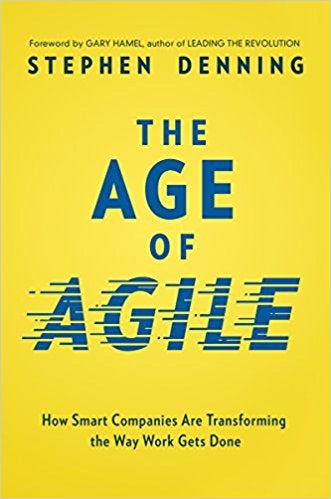 By: Stephen Denning
By: Stephen Denning
Book description (via Amazon): Filled with examples from every sector, “The Age of Agile” helps readers: Master the three laws of Agile Management (team, customer, network); Embrace the new mindset; Overcome constraints; Employ meaningful metrics; Make the entire organization Agile; and more. With this breakthrough approach, even global giants can learn to act entrepreneurially. Their future depends on it.
Why you should read it: If you are incorporating more agile practices into your organization, check out this book for inspiring examples of agile in action and clear, practical advice.
Radical Inclusion: What the Post-9/11 World Should Have Taught Us About Leadership
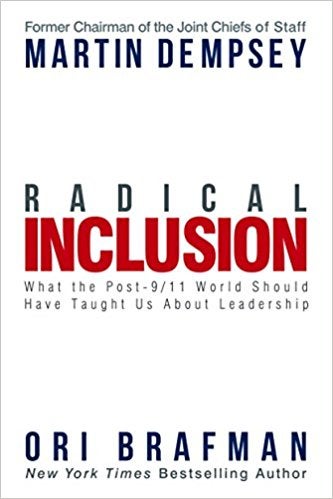 By: Martin Dempsey and Ori Brafman
By: Martin Dempsey and Ori Brafman
Book description (via Amazon): Dempsey and Brafman persuasively explain that today’s leaders are in competition for the trust and confidence of those they lead more than ever before. They assert that the nature of power is changing and should not be measured by degree of control alone.
Why you should read it: “This is one of the most relevant leadership books I've read in awhile,” said one reviewer. “Dempsey and Brafman do an excellent job of capturing two of the top trends that many large organizations wrestle with today: the battle of narratives and digital echo chambers.”
Want more wisdom like this, IT leaders? Sign up for our weekly email newsletter.






